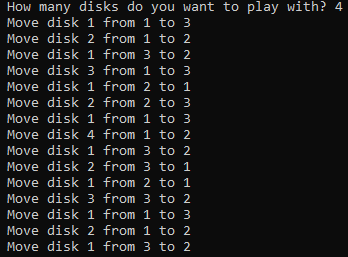This program is an implementation of the classic puzzle Tower of Hanoi! This is my first mostly recursive Assembly program. Any advice and all topical comments on code optimization and conventions is appreciated!
Compiled as follows using VS2017 x64 Native Tools Command Prompt:
> nasm -g -fwin64 hanoi.asm > cl /Zi hanoi.obj msvcrt.lib legacy_stdio_definitions.lib
hanoi.asm
;; bits 64
default rel
extern printf, scanf
section .text
global main
global hanoi
main:
sub rsp, 56
lea rcx, [prompt]
call printf
lea rdx, [rsp+32]
lea rcx, [scan_fmt]
call scanf
cmp eax, 1
jz .call_hanoi
lea rcx, [scan_fail]
call printf
mov eax, 1 ; return 1
.end:
add rsp, 56
ret
.call_hanoi:
mov ecx, dword [rsp+32] ; ecx = num_disks
mov r9d, 3 ; r9d = tmp
mov r8d, 2 ; r8d = dst
mov edx, 1 ; edx = src
call hanoi ; hanoi(num_disks, src, dst, tmp)
xor eax, eax ; return 0
jmp .end
hanoi:
push r12
mov r12d, r8d ; r12d = r8d = dst
push rbp
push rdi
push rsi
mov esi, edx ; esi = edx = src
push rbx
sub rsp, 40
cmp ecx, 1 ; if num_disks == 1
jz .skip_recursive_move
mov ebx, ecx
mov edi, r9d ; edi = r9d = tmp
.move_disk:
lea ebp, [rbx-1H] ; ebp = num_disks - 1
mov r9d, r12d ; r9d = r12d = dst
mov r8d, edi ; r8d = edi = tmp
mov edx, esi ; edx = esi = src
mov ecx, ebp ; ecx = edp = num_disks - 1
call hanoi ; tmp & dst are swapped for this call
mov edx, ebx ; edx = ebx = num_disks
mov r9d, r12d ; update r9d after hanoi call
mov r8d, esi ; update r8d after hanoi call
lea rcx, [prompt_move_disk]
mov ebx, ebp ; ebx = ebp = num_disks - 1
call printf
cmp ebp, 1 ; if num_disks == 1
jz .move_one_disk
mov eax, esi
mov esi, edi
mov edi, eax ; swaps tmp and src (esi and edi)
jmp .move_disk
.skip_recursive_move:
mov edi, edx ; edi = edx = src
.move_one_disk:
add rsp, 40
mov r8d, r12d
mov edx, edi
pop rbx
lea rcx, [prompt_move_one_disk]
pop rsi
pop rdi
pop rbp
pop r12
jmp printf
%macro str 2
%2: db %1, 0
%endmacro
section .rdata
str "How many disks do you want to play with? ", prompt
str "%u", scan_fmt
str {"Uh-oh, I couldn't understand that... No towers of Hanoi for you!", 10}, scan_fail
str {"Move disk 1 from %d to %d", 10}, prompt_move_one_disk
str {"Move disk %d from %d to %d", 10}, prompt_move_disk
Sample output

